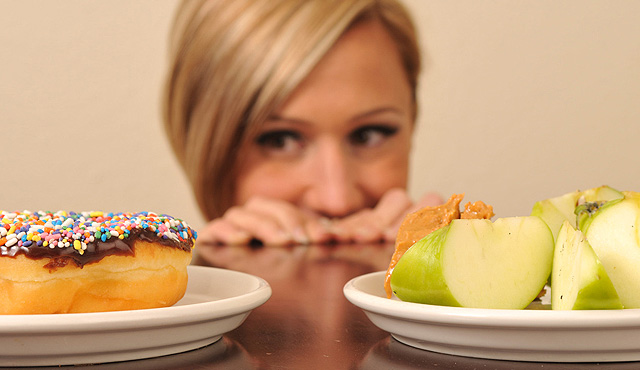Wellness Journey with Joe
Week 9 - Frustrations
9/26/2015

This article appeared in the August 23, 2015 issue of The New York Times Magazine. It was written by Gretchen Reynolds, a frequent contrbuter to the Health and Wellness site of the New York Times.
I include it here because it addresses the evolutionary component of unhealthy decision making. We will soon address this in the Mental Health portion of this "Wellness Journey with Joe" beginning on October 10th.
Sticking to a diet requires self-control and a willingness to forgo present pleasures for future benefits. Not surprisingly, almost everyone yields to temptation at least sometimes, opting for the cookie instead of the apple. Wondering why we so often override our resolve, scientists at the Laboratory for Social and Neural Systems Research at the University of Zurich recently considered the role of stress, which is linked to a variety of health problems, including weight gain. (There’s something to the rom-com cliché of the jilted lover eating ice cream directly from the carton.) But just how stress might drive us to sweets has not been altogether clear. It turns out that even mild stress may immediately alter the workings of our brains in ways that undermine willpower.
For their study, published this month in Neuron, researchers recruited 51 young men who said they were trying to maintain a healthy diet and lifestyle. The men were divided into two groups, one of which served as a control, and then all were asked to skim through images of different kinds of food on a computer screen, rating them for taste and healthfulness.
Next, the men in the experimental group were told to plunge a hand into a bowl of icy water for as long as they could, a test known to induce mild physiological and psychological stress. Relative to the control group, the men developed higher levels of cortisol, a stress hormone.
After that, men from each group sat in a brain-scanning machine and watched pictures of paired foods flash across a screen. Generally, one of the two foods was more healthful than the other. The subjects were asked to click rapidly on which food they would choose to eat, knowing that at the end of the test they would actually be expected to eat one of these picks (chosen at random from all of their choices).
When the two groups were compared, it was found that the men who had recently experienced mild stress were much more likely to choose unhealthful but tasty foods than those in the control group. And the greater the stress — as determined by cortisol levels — the greater the attraction to rich, palatable snacks. The stressed-out men also displayed more activity in parts of the brain linked to the enjoyment of tasty foods and fewer neural messages into a part of the brain that affects long-range planning. In effect, the stress of the ice-water bath had amplified the perceived flavor of unhealthful foods and dampened the ability to consider the future, undermining self-control.
From an evolutionary standpoint, these neurological responses make sense, according to the study’s authors. Animals in stressful situations must focus on their immediate conditions, not some hazy future, and may need to comfort themselves so they can face dangers calmly. In our own world of work deadlines and relationship pressures, we reach for the candy.
It doesn’t have to be this way. When faced with stress, just ‘‘think about an action path that improves your choice,’’ says Todd Hare, lead author of the study. Go for a walk instead of eating. ‘‘If you know you will have a hard time resisting,’’ he adds, ‘‘don’t store snacks at home.’’
|

